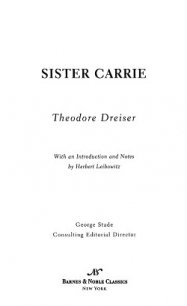Jennie Gerhardt - Драйзер Теодор (книги без регистрации бесплатно полностью сокращений .txt) 📗
himself had a good place in a factory, and would live there a little while.
He returned her a moderate sum that he had saved—one hundred and
fifteen dollars—with the word that he would not need it.
Jennie did not understand, but as the others did not write, she was not
sure but what it might be all right—her father was so determined. But by
degrees, however, a sense of what it really must mean overtook her—a
sense of something wrong, and she worried, hesitating between leaving
Lester and going to see about her father, whether she left him or not.
Would he come with her? Not here certainly. If she were married, yes,
possibly. If she were alone—probably. Yet if she did not get some work
which paid well they would have a difficult time. It was the same old
problem. What could she do? Nevertheless, she decided to act. If she
could get five or six dollars a week they could live. This hundred and
fifteen dollars which Gerhardt had saved would tide them over the worst
difficulties perhaps.
CHAPTER XXXVI
The trouble with Jennie's plan was that it did not definitely take into
consideration Lester's attitude. He did care for her in an elemental way, but he was hedged about by the ideas of the conventional world in which
he had been reared. To say that he loved her well enough to take her for
better or worse—to legalise her anomalous position and to face the world
bravely with the fact that he had chosen a wife who suited him—was
perhaps going a little too far, but he did really care for her, and he was not in a mood, at this particular time, to contemplate parting with her for
good.
Lester was getting along to that time of life when his ideas of
womanhood were fixed and not subject to change. Thus far, on his own
plane and within the circle of his own associates, he had met no one who
appealed to him as did Jennie. She was gentle, intelligent, gracious, a
handmaiden to his every need; and he had taught her the little customs of polite society, until she was as agreeable a companion as he cared to have.
He was comfortable, he was satisfied—why seek further?
But Jennie's restlessness increased day by day. She tried writing out her views, and started a half dozen letters before she finally worded one
which seemed, partially at least, to express her feelings. It was a long
letter for her, and it ran as follows:
"LESTER DEAR,
"When you get this I won't be here, and I want you not to think harshly of me until you have read it all. I am taking Vesta and leaving, and I think it is really better that I should. Lester, I ought to do it. You know when you met me we were very poor, and my condition was such that I didn't think
any good man would ever want me. When you came along and told me
you loved me I was hardly able to think just what I ought to do. You made me love you, Lester, in spite of myself.
"You know I told you that I oughtn't to do anything wrong any more and that I wasn't good, but somehow when you were near me I couldn't think
just right, and I didn't see just how I was to get away from you. Papa was sick at home that time, and there was hardly anything in the house to eat.
We were all doing so poorly. My brother George didn't have good shoes,
and mamma was so worried. I have often thought, Lester, if mamma had
not been compelled to worry so much she might be alive to-day. I thought
if you liked me and I really liked you—I love you, Lester—maybe it
wouldn't make so much difference about me. You know you told me right
away you would like to help my family, and I felt that maybe that would
be the right thing to do. We were so terribly poor.
"Lester, dear, I am ashamed to leave you this way; it seems so mean, but if you knew how I have been feeling these days you would forgive me.
Oh, I love you, Lester, I do, I do. But for months past—ever since your
sister came—I felt that I was doing wrong, and that I oughtn't to go on
doing it, for I know how terribly wrong it is. It was wrong for me ever to have anything to do with Senator Brander, but I was such a girl then—I
hardly knew what I was doing. It was wrong of me not to tell you about
Vesta when I first met you, though I thought I was doing right when I did it. It was terribly wrong of me to keep her here all that time concealed, Lester, but I was afraid of you then—afraid of what you would say and
do. When your sister Louise came it all came over me somehow, clearly,
and I have never been able to think right about it since. It can't be right, Lester, but I don't blame you. I blame myself.
"I don't ask you to marry me, Lester. I know how you feel about me and how you feel about your family, and I don't think it would be right. They would never want you to do it, and it isn't right that I should ask you. At the same time I know I oughtn't to go on living this way. Vesta is getting along where she understands everything. She thinks you are her really
truly uncle. I have thought of it all so much. I have thought a number of times that I would try to talk to you about it, but you frighten me when
you get serious, and I don't seem to be able to say what I want to. So I
thought if I could just write you this and then go you would understand.
You do, Lester, don't you? You won't be angry with me? I know it's for
the best for you and for me. I ought to do it. Please forgive me, Lester, please; and don't think of me any more. I will get along. But I love you—
oh yes, I do—and I will never be grateful enough for all you have done
for me. I wish you all the luck that can come to you. Please forgive me,
Lester. I love you, yes I do. I love you.
"Jennie.
"P.S. I expect to go to Cleveland with papa. He needs me. He is all alone.
But don't come for me, Lester. It's best that you shouldn't."
She put this in an envelope, sealed it, and, having hidden it in her bosom, for the time being, awaited the hour when she could conveniently take her departure.
It was several days before she could bring herself to the actual execution of the plan, but one afternoon, Lester, having telephoned that he would
not be home for a day or two, she packed some necessary garments for
herself and Vesta in several trunks, and sent for an expressman. She
thought of telegraphing her father that she was coming; but, seeing he had no home, she thought it would be just as well to go and find him. George
and Veronica had not taken all the furniture. The major portion of it was in storage—so Gerhardt had written. She might take that and furnish a
little home or flat. She was ready for the end, waiting for the expressman, when the door opened and in walked Lester.
For some unforeseen reason he had changed his mind. He was not in the
least psychic or intuitional, but on this occasion his feelings had served him a peculiar turn. He had thought of going for a day's duck-shooting
with some friends in the Kankakee Marshes south of Chicago, but had
finally changed his mind; he even decided to go out to the house early.
What prompted this he could not have said.
As he neared the house he felt a little peculiar about coming home so
early; then at the sight of the two trunks standing in the middle of the
room he stood dumbfounded. What did it mean—Jennie dressed and
ready to depart? And Vesta in a similar condition? He stared in
amazement, his brown eyes keen in inquiry.
"Where are you going?" he asked.
"Why—why—" she began, falling back. "I was going away."




